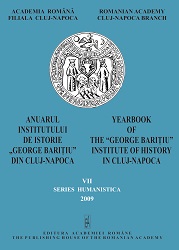SIMION BĂRNUŢIU ŞI FILOSOFIA (I)
SIMION BARNUTIU AND PHILOSOPHY (I)
Author(s): Ionuţ IsacSubject(s): Philosophy
Published by: Editura Academiei Române
Keywords: Romanian Modern philosophy; Transylvanian society; transcendental synthetism; political liberalism; Simion Bărnuţiu; philosophical manuscripts; philosophy andeducation
Summary/Abstract: The present approach focuses some of the main problems of Simion Bărnuţiu’s philosophical activity. While he taught philosophy in Blaj (1839–1845), then in Iaşi (1855–1864), S. Bărnuţiu focused his lectures on the ontology (metaphysics), logic, theory of knowledge and law science. All of them reflect the obvious influence of I. Kant (1724–1804) and W.T. Krug (1770–1842) – the last one being considered in the whole Europe as an authority concerning philosophical education. However, the influence of Krug’s ideas was rather one in their spirit: the philosophical transcendental synthetism entails a political liberalism with openness to the criticism and anti-dogmatism. Thus, Bărnuţiu had found a way to make from Krug’s ideas a support for his own views about the social and political problems in Transylvania. This way, the Romanian Professor grasped and stressed the connections allowed by Krug’s philosophy between metaphysics, epistemology, ontology and ethics, as well as pedagogy. Very often he adapted the Krugian genuine text to his arguments and examples concerning the problems of Transylvanian society at the end of the Middle Ages and the beginning of the modern era.
Journal: Anuarul Institutului de Istorie »George Baritiu« din Cluj-Napoca - Seria HUMANISTICA
- Issue Year: VII/2009
- Issue No: 7
- Page Range: 223-232
- Page Count: 10
- Language: Romanian

